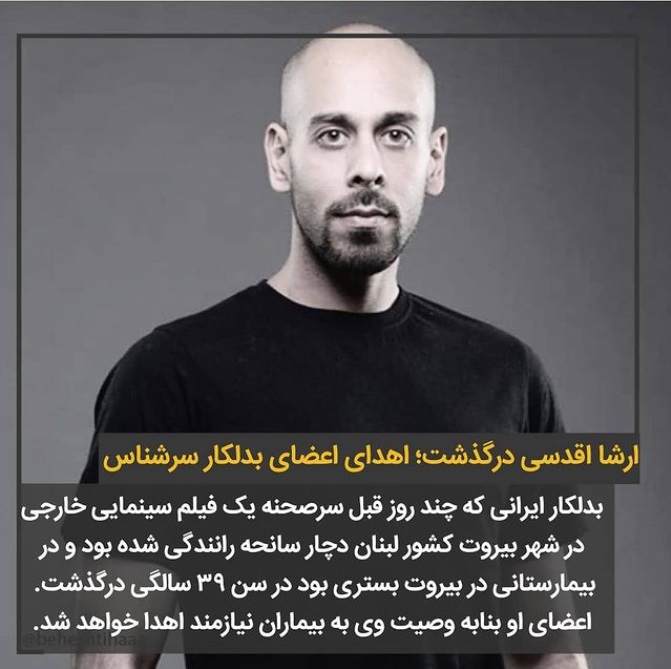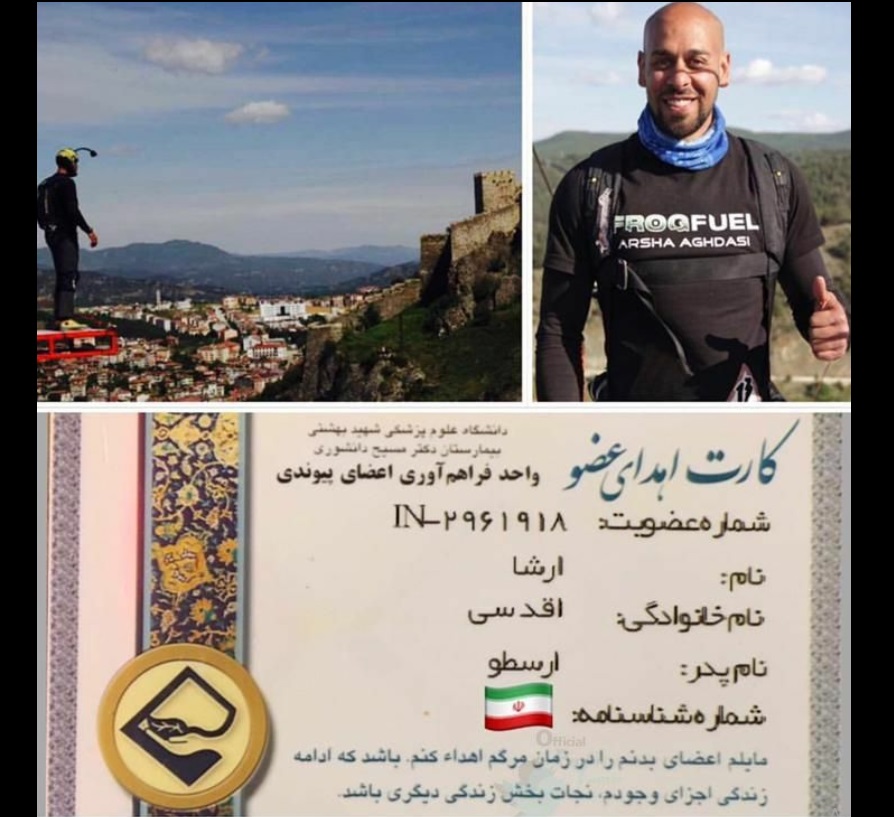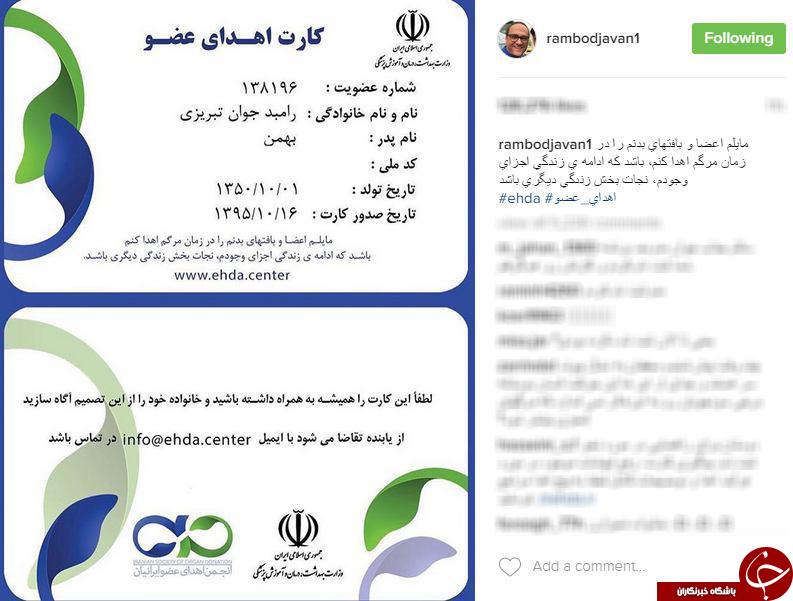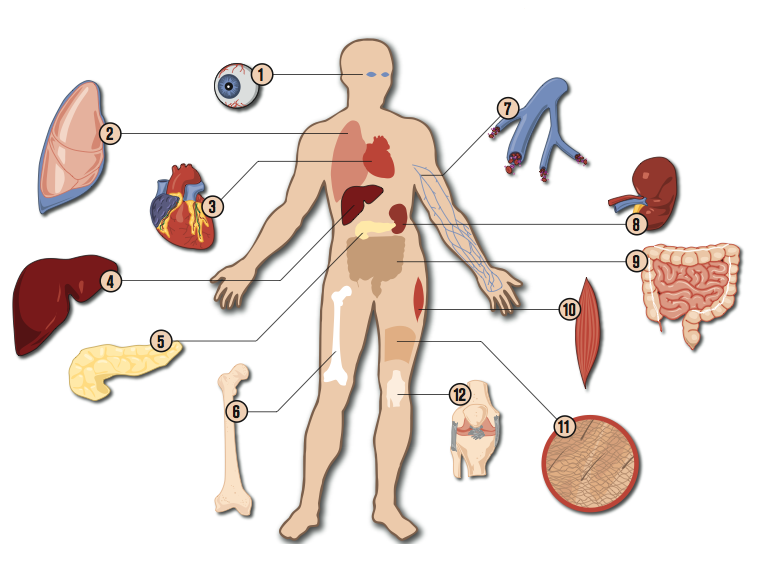
اهدای زندگی Life Donation
به نام خدا، مطالبی راجع به اهدای عضو-اهدای سلولهای بنیادی-اهدای خون-اهدای پلاکت-اهدای پلاسما با همکاری کانون اهدای زندگی دانشگاه بناب--- آدرس صفحه اینستاگرام: ehda.zendeghi@
اهدای زندگی Life Donation
به نام خدا، مطالبی راجع به اهدای عضو-اهدای سلولهای بنیادی-اهدای خون-اهدای پلاکت-اهدای پلاسما با همکاری کانون اهدای زندگی دانشگاه بناب--- آدرس صفحه اینستاگرام: ehda.zendeghi@اندیشه والای زنده یاد ارشا اقدسی در خصوص اهدای عضو
اندیشه والای زنده یاد ارشا اقدسی در خصوص اهدای عضو، حاکی از قلب مهربان و روح بزرگ ایشان بود. روحش شاد و یادش گرامی


Donation card of the presenter of "Khandvaneh", Rambod Javan
Rambod Javan Tabrizi volunteered for organ donation in a humanitarian practice (Date of this news : 2017 January 8).
Young Journalists Club: "Organ Donatin, Life Donation". You must have heard this slogan a lot. It is both bitter and soothing. It is bitter for a mother who does not want to believe that her child's life's office in this world is closed, and at the same time the sound of her beating in another body can be soothing. Rambod Javan Tabrizi, the famous presenter of Khandvaneh program, was among those who joined the group of registered donors and shared a photo of his donation card on his instagram page.
"I would like to donate my organs and tissues at the time of my death, so that the continuation of my life will save another life."

Persian page link : https://ehda-zendeghi.blogsky.com
Translator : Javad Eynaki Maleki
Organ donation: Late satisfaction causes organ loss, especially lungs
For a healthy lung donation and transplantation of a brain-dead patient, there is a need for under 7 hours (after brain death). The lungs become infected faster due to a weakened immune system, and because most brain deaths are due to accidents, the chest is damaged and requires the consent of the family of the brain dead person to keep the lungs healthy quickly. For example, in Ms. Asal Badiee's organ donation, because of the high speed of satisfaction, all of her donated organs, including the lungs, were used for transplantation. If the satisfaction time exceeds 24 hours, only organs such as the kidneys, liver and heart may survive, and other donated organs may be lost.
In Iran, the reason for dissatisfaction is the denial of brain death, because in the country, the concept of brain death has not been properly defined yet, and people think that when their loved one moves his chest, he is alive! While they do not realize that their loved one's heart is beating due to artificial respiration, they do not know that after several days during the production of toxins in the body, the heart of the brain dead person will definitely stop moving.
Another important reason for the dissatisfaction of families is that they say that our body is deformed, but they should be aware that surgical removal of organs is done on a vertical line from the top of the chest to below the navel, and after removing the organs by the method Very clean plastic surgery is sewn on the body so that when we look at the body, only 2 stitches can be seen at the top and bottom, and this very good plastic surgery method is performed out of respect for the corpse, which has received a lot of attention in our religion.
Persian page link :https://ehda-zendeghi.blogsky.com
Thank you for trying to save a human life
Translator : Javad Eynaki Maleki
توجه مهم : به خاطر این که بلاگ اسکای فارسی است، به این علت اعداد انگلیسی در متن به شکل اعداد فارسی دیده می شود
Thousands need organ transplantation in Iran
Image of transplantable organs and tissues after brain death
![]()

The head of the Department of Transplantation and Special Diseases of the Ministry of Health said (quoted in October 2015): There are 27,000 patients in need of organs in Iran, 7 to 10 of whom die every day due to lack of proper organ transplantation.
According to Mehr news agency, Dr. Katayoun Najafizadeh, on the sidelines of the 12th Celebration of The Breath in Milad Tower in Tehran, said: "Between 5,000 and 8,000 people die annually in Iran with brain death, half of whom have donated organs.
He lamented that only about 700 people out of 2500 to 4 thousand cases of donation brain death donate their organs, said: There are 27 thousand patients in need of organs in Iran, 7 to 10 of them daily due to lack of proper organs The transplant member dies.
Najafizadeh added: "The most important reason for the lack of transplant organs is the dissatisfaction of families with organ donation due to the lack of public awareness of the nature of brain death and organ donation."
He said: "In brain death, brain cells are destroyed and brain tissue is transformed into a pasty substance that is irreparable and reversible.
Najafizadeh stated that the confirmation of brain death is only the responsibility of four groups of trained and trusted physicians of the Ministry of Health in the specialties of neurosurgery, neurology, internal medicine and anesthesia, said: Each person with brain death can save eight people from certain death by donating one to eight vital organs (heart, liver, two lungs, two kidneys, pancreas and intestine) and by donating one to 53 tissues It can save one to 53 people from disability.
He added: "Currently, the only national and governmental site for the immediate issuance of an organ donation card is ehda.ir, which immediately after entering the applicant's information, the organ donation card appears and is available."
Najafizadeh stated that transplant patients need more help in receiving medicines after transplantation, price, insurance and availability, and called for more attention of authorities to such patients.
Source: http://salamat.life
Persian page link :https://ehda-zendeghi.blogsky.com
Thank you for trying to save a human life
Translator : Javad Eynaki Maleki
Stages of organ donation after brain death
Identification stage
Identification methods include:
A: Transplant communicators: In each hospital, a person, usually the head nurse or one of the ICU staff, who is selected in coordination with the hospital director, notifies the unit if the patient has brain death.
B: Continuous contact made by the coordinator in the form of telephone calls to all hospitals covered every two days
C: Intermittent rebellion by coordinators in the form of intrusive visits to covered hospitals is usually performed every 2 weeks.
Initial visit stage:
After being informed of the presence of brain death patient, the coordinator of the provision unit will be dispatched to the hospital of origin. In the relevant hospital, the initial visit is made (some patients are removed in the initial examination) if the brain death is confirmed in the initial examination, then the initial E-tape is taken from the patient and the forms are filled out by the coordinator.
Transfer consent:
If the family consents to organ donation, the transfer consent form is signed by the patient's companions and the patient is discharged by his family.
Find recipient step:
After this stage, while contacting the ministry, the recipient will be able to find work based on blood type and size, the general condition of the recipients and their turn in the waiting list and tissue matching.
Transfer stage:
After completing the consent form and carrying out the discharge process and after the necessary coordination, the equipped ambulance will be sent to the hospital of origin along with the anesthesiologist and unit coordinator and the donor will be transferred to Dr. Masih Daneshvari Hospital.
Maintenance stage:
After being transferred to Dr. Masih Daneshvari Hospital, the donor is transferred to the ICU and the patient's condition is stabilized by anesthesiologists and the care process begins. During the maintenance phase, an anesthesiologist and one of the coordinators and a highly qualified nurse constantly control the patient's condition.
Confirmation of brain death:
At this stage, neurosurgery, neurologists, internal medicine and anesthesiologists are invited separately to visit the patient and confirm or deny brain death in the donor. These specialists are chosen directly from the ministry without single intervention.
The stage of obtaining Harvest's consent:
After confirmation of brain death by all four persons of the brain death confirmation group, forensic specialists visit the patient and after final confirmation of brain death, a briefing will be held at the site of the transplant unit in the presence of organ donor, aid worker, psychologist, forensic representative, coordinators and donor family, and while justifying the family, final consent for organ donation will be obtained from them.
Coordination stage:
In this stage, coordination with different teams across the country and operating room officials and personnel about the time of operation and the next steps is done.
Harvest Stage:
At this stage, the patient will be taken to the operating room and delivered to the present team in the operating room. Members are removed. And at the end of the operation, the site of the operation is well restored by one of the surgeons and the patient delivers the morgue.
The transfer stage of the deceased:
At this stage, after the discharge process by the provision unit, the forensic ambulance will be notified by the unit for transfer to the forensics or burial place.
Appreciation stage and participation in the funeral:
At this stage, the coordinator of the collection unit with a special appreciation letter and a large bouquet of flowers attends the donor's funeral and, while appreciating the family, if the conditions allow him to read the text of the commendation behind the speaker.
The Writing Stage of the Harvest Report
After each harvest, the report of how to do it in all details is written by the organ donor.
Thank you for trying to save a human life
Persian page link :https://ehda-zendeghi.blogsky.com